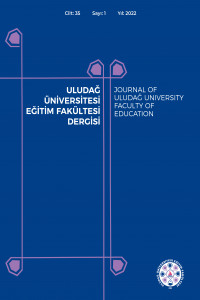Articles
Issue Editorial Board

 0000-0001-7131-5112
0000-0001-7131-5112



 0000-0003-0492-0317
0000-0003-0492-0317


Aim & Scope
The Journal of Uludag University Faculty of Education is a peer-reviewed, scientific journal. Established in 1986, JUUFE was published in print until 1999, after which it was published both in print and electronically. It published one issue a year until 2004, and two issues a year from 2004-2019. As from 2020, JUUFE is published online only (e-ISSN 2667-6788) three times a year (April-August-December).
JUUFE is hosted by the DergiPark online journal platform and follows the editorial workflow management system provided. JUUFE adopts a double blind peer review policy. New submissions are first checked for technical issues and are then sent to the relevant field editor, who appoints two peer reviewers from the pool of field experts. The article evaluation process can take 2-4 months.
JUUFE envisions three major aims:
1. To disseminate knowledge that is based on robust theoretical principles and sound methodological frameworks.
2. To address significant educational issues on a national and international level.
3. To inform national and international educational policies.
Please take into consideration the following points when determining the scope of your submission.
JUUFE:
1. considers for publication articles which encompass the themes of education, learning, teaching, school, student and teacher.
2. Gives priority to empirical research articles.
3. Gives priority to submissions that include advanced statistical procedures.
4. Gives priority to qualitative research studies that report the data analyses in detail.
5. Expects mixed-method studies to provide a detailed explanation of how the chosen design is appropriate for the theoretical framework.
6. Requires submissions derived from Doctoral and Masters dissertations to include the findings related to the main hypotheses.
7. Requires submissions reporting instrument development and adaptation studies to include reports of criterion validity, convergent and divergent validity, and measurement invariance in addition to structural validity.
JUUFE does not consider for publication the following submissions:
• studies reporting prospective teachers’/teachers’ or students' opinions and perceptions only;
• studies which are based on categoric variables (class level, school type, department, gender, etc.) collected from the demographic section of data collection instruments;
• coursebook evaluations;
• literature reviews that are not prepared in accordance with the systematic literature review format generally accepted by the international literature.
Author Guidelines
General Rules
• Manuscripts should be compliant with APA Style, 7th Edition.
• Manuscripts may be written in Turkish or English.
• Manuscripts that are not prepared according to the journal guidelines will not be considered.
• Editors and referees may make changes and corrections that they deem appropriate in the submitted manuscripts.
• A structured, extended abstract of 1,500-2,000 words should be provided in English for Turkish manuscripts, and in Turkish for English manuscripts. The extended abstract should have the following sub-headings: "introduction", "method", "results", "conclusion, suggestion and recommendations".
• English translations should be done by experts and checked for linguistic accuracy. Turkish manuscripts should also be checked for grammar, spelling, and discourse conventions.
• The word limit of the manuscript is 10,000 (abstract, main text and bibliography).
Ethical Principles and Publication Policy
The publication of an article in a peer-reviewed journal is an essential building block in the development of a coherent and respected network of knowledge. It is a direct reflection of the quality of the work of the authors and the institutions that support them. Peer-reviewed articles support and embody the scientific method. Therefore, it is of the utmost importance that all parties included in the publication process (authors, readers and researchers, publisher, reviewers and editors) comply with the standards of ethical considerations. JUUFE expects all parties to hold the following ethical responsibilities.
The following ethical duties and responsibilities have been prepared in the light of the guide and policies made by the Committee on Publication Ethics (COPE).
Duties of Authors
Article submissions to JUUFE are conducted through the DergiPark online journal management system. Submissions via email are not accepted.
Authors wishing to submit their work to JUUFE should upload all the necessary submission documents in the required format (manuscript without author details, cover page with author details, similarity report, signed permission granted by the relevant ethical research committee, article copyright form, article submission form). The review process will not be started in the event of missing documents.
Authors are expected to hold to the ethical duties and responsibilities as presented in the Responsible research publication: international standards for authors guidelines published via open access by COPE.
❖ The research being reported should have been conducted in an ethical and responsible manner and should comply with all relevant legislation.
❖ Researchers should present their results clearly, honestly, and without fabrication, falsification or inappropriate data manipulation.
❖ Researchers should strive to describe their methods clearly and unambiguously so that their findings can be confirmed by others.
❖ Researchers should adhere to publication requirements that submitted work is original, is not plagiarised, and has not been published elsewhere.
❖ Authors should take collective responsibility for submitted and published work.
❖ The authorship of research publications should accurately reflect individuals’ contributions to the work and its reporting.
❖ Funding sources and relevant conflicts of interest should be disclosed
Duties of the Editors
The Editor of the JUUFE is expected to hold the ethical duties and responsibilities as presented in "COPE Code of Conduct and Best Practice Guidelines for Journal Editors" ve "COPE Best Practice Guidelines for Journal Editors".
General duties and responsibilities of editors
Editors should be accountable for everything published in their journals. Editors should
❖ strive to meet the needs of readers and authors;
❖ strive to constantly improve their journal;
❖ have processes in place to assure the quality of the material they publish;
❖ champion freedom of expression;
❖ maintain the integrity of the academic record;
❖ preclude business needs from compromising intellectual and ethical standards;
❖ always be willing to publish corrections, clarifications, retractions and apologies when needed.
Relations with readers
❖ Readers should be informed about who has funded research or other scholarly work and whether the funders had any role in the research and its publication and, if so, what this was.
Relations with authors
❖ Editors’ decisions to accept or reject a paper for publication should be based on the paper’s importance, originality and clarity, and the study’s validity and its relevance to the remit of the journal.
❖ Editors should not reverse decisions to accept submissions unless serious problems are identified with the submission.
❖ New editors should not overturn decisions to publish submissions made by the previous editor unless serious problems are identified.
❖ A description of peer review processes should be published, and editors should be ready to justify any important deviation from the described processes.
❖ Journals should have a declared mechanism for authors to appeal against editorial decisions.
❖ Editors should publish guidance to authors on everything that is expected of them. This guidance should be regularly updated and should refer or link to this code.
❖ Editors should provide guidance about criteria for authorship and/or who should be listed as a contributor following the standards within the relevant field.
Relations with reviewers
❖ Editors should provide guidance to reviewers on everything that is expected of them including the need to handle submitted material in confidence. This guidance should be regularly updated and should refer or link to this code.
❖ Editors should require reviewers to disclose any potential competing interests before agreeing to review a submission.
❖ Editors should have systems to ensure that peer reviewers’ identities are protected unless they use an open review system that is declared to authors and reviewers.
Relations with editorial board members
❖ Editors should provide new editorial board members with guidelines on everything that is expected of them and should keep existing members updated on new policies and developments.
Relations with journal owners and publishers
❖ The relationship of editors to publishers and owners is often complex but should be based firmly on the principle of editorial independence.
❖ Editors should make decisions on which articles to publish based on quality and suitability for the journal and without interference from the journal owner/publisher.om the journal owner/publisher.
❖ Editors should have a written contract(s) setting out their relationship with the journal’s owner and/or publisher.
❖ The terms of this contract should be in line with the COPE Code of Conduct for Publishers
Editorial and peer review processes
❖ Editors should strive to ensure that peer review at their journal is fair, unbiased and timely.
❖ Editors should have systems to ensure that material submitted to their journal remains confidential while under review.
❖ Editors should take all reasonable steps to ensure the quality of the material they publish, recognising that journals and sections within journals will have different aims and standards.
Protecting individual data
❖ Editors should always protect the confidentiality of individual information obtained in the course of research or professional interactions.
Encouraging ethical research (e.g. research involving humans)
❖ Editors should endeavour to ensure that research they publish was carried out according to the relevant internationally accepted guidelines.
❖ Editors should seek assurances that all research has been approved by an appropriate body (e.g. research ethics committee, institutional review board) where one exists. However, editors should recognise that such approval does not guarantee that the research is ethical.
Dealing with possible misconduct
❖ Editors have a duty to act if they suspect misconduct or if an allegation of misconduct is brought to them. This duty extends to both published and unpublished papers.
❖ Editors should first seek a response from those suspected of misconduct. If they are not satisfied with the response, they should ask the relevant employers, or institution, or some appropriate body (perhaps a regulatory body or national research integrity organization) to investigate.
❖ Editors should make all reasonable efforts to ensure that a proper investigation into alleged misconduct is conducted; if this does not happen, editors should make all reasonable attempts to persist in obtaining a resolution to the problem.
Ensuring the integrity of the academic record
❖ Errors, inaccurate or misleading statements must be corrected promptly and with due prominence.
Intellectual property
❖ Editors should be alert to intellectual property issues and handle potential breaches of intellectual property laws and conventions.
Encouraging debate
❖ Editors should encourage and be willing to consider cogent criticisms of work published in their journal.
❖ Authors of criticised material should be given the opportunity to respond.
❖ Studies reporting negative results should not be excluded.
Complaints
❖ Editors should respond promptly to complaints and should ensure there is a way for dissatisfied complainants to take complaints further.
Commercial considerations
❖ Commercial considerations should not affect editorial decisions.
Conflicts of interest
❖ Editors should manage their own conflicts of interest as well as those of their staff, authors, reviewers and editorial board members.
❖ Journals should have a declared process for handling submissions from the editors, employees or members of the editorial board to ensure unbiased review.
Duties of Section Editors
JUUFE adopts a double blind peer review policy. The submissions and review processes are conducted via the DergiPark electronic journal management system. Section editors manage the review process of the articles assigned to them and should guarantee an unbiased blind peer review.
The section editors of JUUFE are expected to hold the duties and responsibilities described in the "COPE Code of Conduct and Best Practice Guidelines for Journal Editors".
Section editors should:
❖ objectively evaluate a submission in terms of its contributions to the relevant scientific literature, the readers and the journal, as well as its accordance with scientific criteria
❖ appoint two peer reviewers from the related field and who hold at least a doctoral degree, taking care to ensure variety in affiliation.
❖ guarantee the anonymity of both parties during the peer review process..
❖ ensure that the principle of freedom of thought is upheld and intellectual property rights are protected during the peer review process.
❖ follow up and complete the review process in a timely manner.
❖ offer constructive and directive advice to increase the quality of the submission during the peer review process. In the event of a rejection, the section editor should explain the justifications for the decision.
Duties of Peer Reviewers
To guarantee an independent and objective review, JUUFE employs a double blind peer review process. This process is managed through the DergiPark electronic journal management system, and communication between peer reviewers and authors is mediated by the relevant section editor. In this respect, Uludağ Universit Faculty of Education Journal expects peer reviewers to hold to the ethical duties and responsibilities as presented by COPE in the Ethical Guidelines for Peer Reviewers.
Peer reviewers should:
❖ only agree to review manuscripts for which they have the subject expertise required to carry out a proper assessment and which they can assess in a timely manner
❖ respect the confidentiality of peer review and not reveal any details of a manuscript or its review, during or after the peer-review process, beyond those that are released by the journal
❖ not use information obtained during the peer review process for their own or any other person’s or organization’s advantage, or to disadvantage or discredit others
❖ declare all potential conflicting interests, seeking advice from the journal if they are unsure whether something constitutes a relevant interest
❖ not allow their reviews to be influenced by the origins of a manuscript, by the nationality, religious or political beliefs, gender or other characteristics of the authors, or by commercial considerations
❖ be objective and constructive in their reviews, refraining from being hostile or inflammatory and from making libellous or derogatory personal comments
❖ acknowledge that peer review is largely a reciprocal endeavour and undertake to carry out their fair share of reviewing and in a timely manner
❖ provide journals with personal and professional information that is accurate and a true representation of their expertise
❖ recognize that impersonation of another individual during the review process is considered serious misconduct.
Duties of the Publisher
Bursa Uludağ University, the publisher of Uludağ UniversityFaculty of Education Journal is a non-profit publicly-owned university. In accordance with its founding philosophy, Bursa Uludağ University publishes the Uludağ University Faculty of Education Journal with the aim of publishing and disseminating original and current scientific research on teaching and education at international standards. Bursa Uludağ University is aware that it must observe the ethical responsibilities below.
❖ The editor is responsible for processing all the manuscripts submitted to Uludağ University Faculty of Education Journal.
❖ The editor ensures independent decisions.
❖ The Journal of Uludağ University Faculty of Education reserves all rights of ownership and copyright and is responsible for keeping records of every publication.
❖ The editor is responsible for preventing any kind of scientific misconduct, predatory behaviour, and plagiarism.
Open Acess Policy
The manuscripts submitted to JUUEFD for publication should be original and not have been published before or not submitted to anywhere else for publication.
Authors agree on the requirements of the open-access policy and Creative Commons Attribution-NonCommercial-ShareAlike 4.0 International license. They also accept to disclaim the copyright of the study by submitting to JUUEFD.
Since Authors acknowledge transferring the copyright of their studies to JUUEFD, the Editorial Board of JUUEFD hold the rights to continue publication processes. Therefore, Author(s), who want to withdraw their submission, have to send an article withdrawal request to JUUEFD. Their withdrawal request will be evaluated by the Editorial Board of JUUEFD, and the decision will be sent to Author(s) within a week.
The following rights of Author(s) are reserved:
❖ Patent rights,
❖ All unregistered rights apart from copyright,
❖ Duplication rights on condition that the study is not sold,
❖ The right to use the whole or parts of the study in the author's own books or other academic studies on condition that reference is given,
❖ The right to publish the study on personal websites or open archive of their university on condition that the copyright details are provided.
Price Policy
The Journal of Uludag University Faculty of Education DOES NOT charge fees for article submission, processing, or publication.
Journal of Uludag University Faculty of Education ©2025 by Bursa Uludag University is licensed under CC BY-NC 4.0

